

Weather vocabulary. Food related vocabulary. List of Food Adjectives. Yeah WordPress was acting up a couple of days ago.

9 Types of Mnemonics for Better Memory. Mnemonics are memory devices that help learners recall larger pieces of information, especially in the form of lists like characteristics, steps, stages, parts, phases, etc.
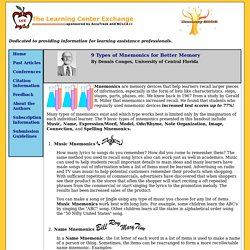
We knew back in 1967 from a study by Gerald R. Suffixes : English. How to Teach Vocabulary by Word Associations to ESL Students. For the past month I have been teaching my fifth and sixth grade EFL students new vocabulary with word associations.

The students have enjoyed my teaching and learning method, and I honestly believe they are making more progress in learning, using, and retaining vocabulary than before. Vocabulary - football. Mesmerize Your Students With Memrise. When I was a student, I used to have a history teacher who would have me recite facts I had memorized while standing on my head (I learned them upright, but recited them upside down).
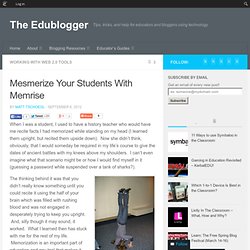
Now she didn’t think, obviously, that I would someday be required in my life’s course to give the dates of ancient battles with my knees above my shoulders. I can’t even imagine what that scenario might be or how I would find myself in it (guessing a password while suspended over a tank of sharks?). OK, Now Recite The Quadratic Equation. Backwards. The thinking behind it was that you didn’t really know something until you could recite it using the half of your brain which was filled with rushing blood and was not engaged in desperately trying to keep you upright. One such tool is the online application Memrise. Teaching Across the Board. Margarita Calderón explains why developing a whole-school approach to English learners’ academic achievement is key to Common Core implementation Every school district in every state has or soon will have a significant contingent of English language learners (ELLs).
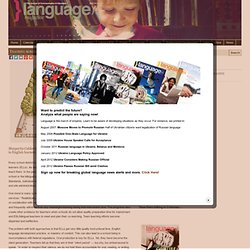
As language-minority student populations grow, all schools need to be prepared to teach them. In the past, outcomes for ELLs were the responsibility of one or two ESL teachers in a school or the bilingual school down the road. However, as a consequence of the Common Core State Standards, individual state standards, Race to the Top, and other initiatives, all mainstream teachers and site administrators are now responsible for all students. VOCABULARY CHALLENGE: 5 WAYS TO STORE WORDS.
I love words.

When I read the post The Two Week Vocabulary Blogging Challenge I thought I could share some of the ways my students and I store words. I have to confess I am a big fan of word cards, the small pieces of cards that have the foreign word on one side and its translation on the other, no matter if that is a picture, a definition or anything which can help the memorization process . Solving Word Meanings: Engaging Strategies for Vocabulary Development. ReadWriteThink couldn't publish all of this great content without literacy experts to write and review for us.
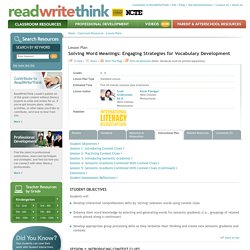
If you've got lessons plans, videos, activities, or other ideas you'd like to contribute, we'd love to hear from you. More Find the latest in professional publications, learn new techniques and strategies, and find out how you can connect with other literacy professionals. Teaching Vocabulary. Vocabulary is the knowledge of words and word meanings.
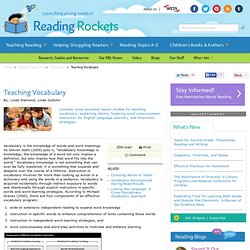
As Steven Stahl (2005) puts it, "Vocabulary knowledge is knowledge; the knowledge of a word not only implies a definition, but also implies how that word fits into the world. " Vocabulary knowledge is not something that can ever be fully mastered; it is something that expands and deepens over the course of a lifetime. The Language Teacher Online 21.4: Mnemonics in the ESL/EFL Classroom. Return to The Language Teacher Online The topic of mnemonics and its use in the ESL/EFL classroom is rarely discussed in professional journals or even casually among teachers.
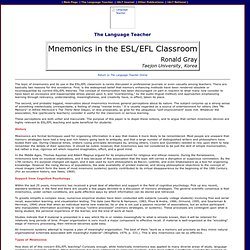
There are basically two reasons for this avoidance. First, is the widespread belief that memory enhancing methods have been rendered obsolete or inconsequential by current ESL/EFL theories. The concept of memorization has been discouraged (in part in reaction to what many now consider to have been an excessive and inappropriate stress placed upon it, and "overlearning," by the audio-lingual method) and approaches emphasizing learning through relevancy, understanding, meaningfulness, and creativity have, in effect, taken its place.
Mnemonic Dictionary - Fun and easy way to build your vocabulary! Mnemonics - help you to learn English. Activities to teach vocabulary 2. Idoine - Using Mnemonics in Vocabulary Tests. The Internet TESLJournal Daniel Idoine-ShiraiFukuoka Education Center (Fukuoka, Japan)didoine {at} yahoo [dot] com Abstract The Grammar Translation style of teaching English common in high schools in and other Asian countries requires students to learn a large vocabulary for regular class tests and in preparation for university entrance examinations.
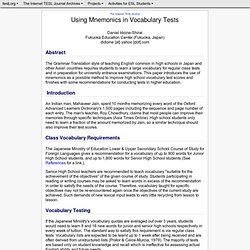
This paper introduces the use of mnemonics as a possible method to improve high school vocabulary test scores and finishes with some recommendations for conducting tests in higher education. Mnemonic Strategies. How to Memorize English Vocabulary and Grammar the Easy Way. By Irena Dewey Do you have problems remembering English vocabulary or expressions? Do you find it difficult to memorize idiomatic expressions or slang? Do you struggle to understand grammar concepts? GRE Vocabulary Game: Memorization and Mnemonics. Mnemonic Dictionary - Fun and easy way to build your vocabulary! 5 techniques to speak any language: Sid Efromovich at TEDxUpperEastSide. What is the origin of the term to "bottle it", meaning to back out, give up?
Semantic enigmas. Fixed Expression List - Iain Robson ESL. LEARN HOW TO MEMORIZE 100 WORDS @ PER HOUR. Teaching English: Phrasal Verbs ESL Lesson Plan. English Phrasal Verbs List (Pre-Intermediate ~ Intermediate) ESL/EFL English Current. Lesson 2: Fixed Expressions. Learn English, IELTS, EFL,ESL Public Speaking, Grammar, Literature, Linguistics by NEO. Pelmanism for paraphrasing. Copyright © 2014 Emma Gore-Lloyd This activity combines paraphrasing skills with a children’s memory game and can help students practise Sentence Transformation exercises the likes of which appear in the Cambridge exams. It takes a bit of preparation but it’s worth it (and you can reuse it). It appears in my resources thanks to Louisa Cristo who shared it at a teacher’s meeting last year. You can use any Sentence Transformation exercise. Prepare cards of one colour with original phrases from the exercise on them, and write the paraphrased versions on cards a different colour.
Original sentence: This time I didn’t manage to win first prize. In class, you can play Pelmanism, or the memory game. Now pair up the students and give out the Sentence Transformation exercise. I’ve done this activity with teens and adults and both groups have enjoyed the game and the opportunity to make the connections. Share this with other teachers: Ways of explaining or clarifying - synonyms or related words for Ways of explaining or clarifying. Metaphors. Nature. Nine Things You Probably Didn’t Know About Swear Words. Four-letter words have been around since the days of our forebears—and their forebears, too. In Holy Sh*t: A Brief History of Swearing, a book out this month from Oxford University Press, medieval literature expert Melissa Mohr traces humans’ use of naughty language back to Roman times.
NewsFeed asked Mohr what surprising tidbits readers might stumble upon amidst the expletives. Here are nine talking points from her opus for your next (presumably, pretty edgy) cocktail hour. (FROM THE MAGAZINE: Help! My Baby Swears) 1. About 0.7% of the words a person uses in the course of a day are swear words, which may not sound significant except that as Mohr notes, we use first-person plural pronouns — words like we, our and ourselves — at about the same rate. English Literary Terms - ESL Guide - JWU Providence Library at Johnson & Wales University-Providence Campus. Style - What is the difference between "I work in a project" vs "I work on a project" Adverb Placement.